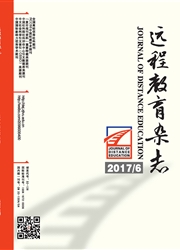

 中文摘要:
中文摘要:
远程教育中的学习支持服务可分为"非学术性支持"与"学术性支持"两大类。如果说非学术性支持的目的是"让学习真正发生",那么"学术性支持"则是在"学习发生"的基础上"使学习达到既定的目标"。与渐趋成熟的"非学术性支持"相比,"学术性支持"的实践工作尚处于初级发展阶段。助学教师在面向学习内容开展学术性支持时存在着面授时不关注课程整体的系统性、导入过多资源或自立课程线索、倾向应动助学而忽视主动助学等误区;在面向学习活动开展学术性支持时,存在着交流渠道越多越好、将互动交流当作目的、互动交流止于"敞现"等误区;在面向学习评价开展学术性支持时,存在着评价"一刀切"、互动交流部分无法评价、助学教师包揽所有评价等误区。这些误区的背后正折射出助学教师对远程培训特点的不理解。
 英文摘要:
英文摘要:
In distance education,learning support includes "non-academic support" and "academic support".If we say the aim of non-academic support is "to make the learning really happen",while the aim of academic support is "to make the learning reach the goal".Compared to matured non-academic support,academic support is still developing on the initial stage from the practical dimension.As to the content-oriented support,the facilitators tend to make the following mistakes:paying no attention to the course systematicness at face to face period;adding too many resources or rearranging course clue;waiting for learners'feedback passively rather than finding the problems actively,etc.,As to the activity-oriented support,the facilitators tend to make the following mistakes:providing many communication tools to learners;considering communication as the goal;no conclusion at the end of the communication etc.,As to the assessment-oriented support,the facilitators tend to make the following mistakes:applying the same rubric to all kinds of trainings;no any methods on the communication assessment;undertaking the whole assessment tasks.Behind these mistakes,we can find the facilitators'misunderstanding on online training features.
 同期刊论文项目
同期刊论文项目
 同项目期刊论文
同项目期刊论文
 期刊信息
期刊信息
